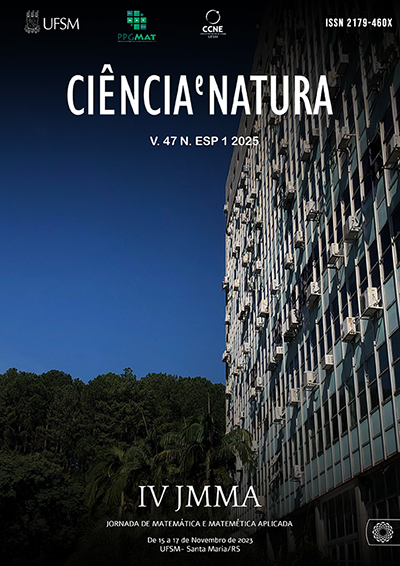Comportamento vibratório de vigas Euler-Bernoulli sobre fundação elástica: condições de contorno não-clássicas, ortogonalidade e força externa
DOI:
https://doi.org/10.5902/2179460X89806Palavras-chave:
Análise modal, Condições de contorno não clássicas, Força externa, Fundação elástica, Ortogonalidade, Solução fundamental, Viga Euler-BernoulliResumo
Neste trabalho apresentamos a teoria de vigas Euler-Bernoulli, também conhecida como teoria clássica, para uma viga sobre fundação elástica e com as condições de contorno não-clássicas. O nosso objetivo é ampliar a classe de problemas que usa a teoria da solução fundamental para obter a equação característica, as frequências naturais, os modos de vibração e a resposta forçada de problemas que envolvem vibrações. Como o problema considerado é não-clássico, devido as condições de contorno consideradas, é necessário obter uma condição de ortogonalidade que envolve a massa anexada no extremo da viga para desacoplar as equações e escrever a resposta forçada.
Downloads
Referências
Abu-Hilal, M. (2003). Forced Vibration of Euler-Bernoulli Beams by Means of Dynamic Green Functions. Journal of Sound and Vibration, 267:191–207. DOI: https://doi.org/10.1016/S0022-460X(03)00178-0
Basu, D. & Rao, N. S. V. K. (2012). Analytical Solutions for Euler-Bernoulli Beam on Viscoelastic Foundation Subjected to Moving Load. International Journal for Numerical and Analytical Methods in Geomechanics, 37(8):945–960. DOI: https://doi.org/10.1002/nag.1135
Bergman, L. A. & Nicholson, J. W. (1985). Forced Vibration of a Damped Combined Linear System. Journal of Vibration, Acoustics, Stress, and Reliability in Design, 107(275):1–7. DOI: https://doi.org/10.1115/1.3269257
Julio Ruiz Claeyssen, G. C. & Jung, C. (1999). A Direct Approach to Second-Order Matrix Non-Classical Vibrating Equations. Applied Numerical Mathematics, 30:65–78. DOI: https://doi.org/10.1016/S0168-9274(98)00085-3
Petermann, R. (2023). A soluç˜ao fundamental no c´alculo da resposta forçada de uma viga Euler-Bernoulli sobre fundação el´astica e com condições de contorno n˜ao- cl´assicas. (Dissertação de Mestrado) Mestrado em Matem´atica, Universidade Federal de Santa Maria, Santa Maria.
Rao, S. S. (2007). Vibration of Continuos Systems. New Jersey: John Wiley & Sons.
Xu, Y. & Wang, N. (2020). Transverse Free Vibration of Euler-Bernoulli Beam with Preaxial Pressure Resting on a Variable Pasternak Elastic Foundation Under Arbitrary Boundary Conditions. Latin American Journal of Solids and Structures, 17(7):1–17. DOI: https://doi.org/10.1590/1679-78256150
Downloads
Publicado
Como Citar
Edição
Seção
Licença
Copyright (c) 2024 Ciência e Natura

Este trabalho está licenciado sob uma licença Creative Commons Attribution-NonCommercial-ShareAlike 4.0 International License.
Para acessar a DECLARAÇÃO DE ORIGINALIDADE E EXCLUSIVIDADE E CESSÃO DE DIREITOS AUTORAIS clique aqui.
Diretrizes Éticas para Publicação de Revistas
A revista Ciência e Natura está empenhada em garantir a ética na publicação e na qualidade dos artigos.
A conformidade com padrões de comportamento ético é, portanto, esperada de todas as partes envolvidas: Autores, Editores e Revisores.
Em particular,
Autores: Os Autores devem apresentar uma discussão objetiva sobre a importância do trabalho de pesquisa, bem como detalhes e referências suficientes para permitir que outros reproduzam as experiências. Declarações fraudulentas ou intencionalmente incorretas constituem comportamento antiético e são inaceitáveis. Artigos de Revisão também devem ser objetivos, abrangentes e relatos precisos do estado da arte. Os Autores devem assegurar que seu trabalho é uma obra totalmente original, e se o trabalho e / ou palavras de outros têm sido utilizadas, isso tem sido devidamente reconhecido. O plágio em todas as suas formas constitui um comportamento publicitário não ético e é inaceitável. Submeter o mesmo manuscrito a mais de um jornal simultaneamente constitui um comportamento publicitário não ético e é inaceitável. Os Autores não devem submeter artigos que descrevam essencialmente a mesma pesquisa a mais de uma revista. O Autor correspondente deve garantir que haja um consenso total de todos os Co-autores na aprovação da versão final do artigo e sua submissão para publicação.
Editores: Os Editores devem avaliar manuscritos exclusivamente com base no seu mérito acadêmico. Um Editor não deve usar informações não publicadas na própria pesquisa do Editor sem o consentimento expresso por escrito do Autor. Os Editores devem tomar medidas de resposta razoável quando tiverem sido apresentadas queixas éticas relativas a um manuscrito submetido ou publicado.
Revisores: Todos os manuscritos recebidos para revisão devem ser tratados como documentos confidenciais. As informações ou ideias privilegiadas obtidas através da análise por pares devem ser mantidas confidenciais e não utilizadas para vantagens pessoais. As revisões devem ser conduzidas objetivamente e as observações devem ser formuladas claramente com argumentos de apoio, de modo que os Autores possam usá-los para melhorar o artigo. Qualquer Revisor selecionado que se sinta desqualificado para rever a pesquisa relatada em um manuscrito ou sabe que sua rápida revisão será impossível deve notificar o Editor e desculpar-se do processo de revisão. Os Revisores não devem considerar manuscritos nos quais tenham conflitos de interesse resultantes de relacionamentos ou conexões competitivas, colaborativas ou outras conexões com qualquer dos autores, empresas ou instituições conectadas aos documentos.






